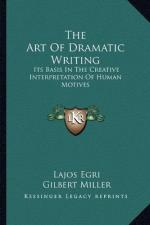
|
| Name: _________________________ | Period: ___________________ |
This test consists of 15 multiple choice questions and 5 short answer questions.
Multiple Choice Questions
1. It is stated by the author that rising conflict will result in _____.
(a) Static.
(b) First-rate dialogue.
(c) Second-rate dialogue.
(d) Transition.
2. Who wrote that the obligatory scene "is the immediate goal toward which the play is driving"?
(a) John Howard Lawson.
(b) Lajos Egri.
(c) Albert Maltz.
(d) Anton Chekhov.
3. According to the author, a good _____ is where something vital is at stake at the very beginning of a play.
(a) Storyline.
(b) Plot.
(c) Point of attack.
(d) Introduction.
4. When a scene ends the same way it begins, it is ____, and therefore boring because it ignores drama, according to the author.
(a) Static.
(b) Recurring.
(c) Déjà vu.
(d) Redundant.
5. Who is the object of Tartuffe's lust in "Tartuffe"?
(a) Elmire.
(b) Mariane.
(c) Orgon.
(d) Madame Pernelle.
6. What verb means to lay stress upon stress?
(a) Categorize.
(b) Emphasize.
(c) Blow up.
(d) None of the answers is correct.
7. The action of "Hedda Gabler" takes place in a villa in _____.
(a) Kane.
(b) Krostein.
(c) Krakow.
(d) Christiania.
8. In one line of dialogue, a character will be delighted with their life, and two lines later, disturbingly mad. What kind of conflict is this an example of?
(a) Bi-polar.
(b) Jumping.
(c) Unpredictable.
(d) Flip-flop.
9. In Book III: Conflict, Chapter 1: Origin of Action, the author claims that every action has components that _____.
(a) Cause pain.
(b) Require thinking.
(c) Cause it to happen.
(d) Cause conflict.
10. The author asserts that despite bad writing, many plays garner fans because _____.
(a) The playwright is well known.
(b) The actors are attractive.
(c) The costumes are well designed.
(d) Their subject is unique.
11. The premise of a dramatic work, according to the author, is not the same as _____.
(a) A universal truth.
(b) The protagonist.
(c) The plot.
(d) The antagonist.
12. Who wrote the play "Ghosts"?
(a) Anton Chekhov.
(b) Lajos Egri.
(c) Henrik Ibsen.
(d) William Shakespeare.
13. Who wrote the play "Dinner at Eight"?
(a) George S. Kaufman.
(b) Henrik Ibsen.
(c) Edna Ferber.
(d) George S. Kaufman and Edna Ferber.
14. What dance does the character of Nora famously dance in "A Doll's House"?
(a) The Waltz.
(b) The Tarantella.
(c) The Tango.
(d) The Jitterbug.
15. What happens at the end of "The Cherry Orchard"?
(a) A new orchard is planted.
(b) The cherries are harvested.
(c) The orchard is cut down.
(d) Everyone drinks cherry wine.
Short Answer Questions
1. Who wrote the play "Tobacco Road"?
2. When was "Tobacco Road" first performed?
3. When a writer has trouble entering and exiting his characters, the author believes he _____.
4. Lajos Egri believes that the greatest fault of the play "Stevedore", is a serious lack of _____.
5. What term refers to a test, trial, or tentative procedure; an act or operation to discover something unknown or of testing a principle?
|
This section contains 437 words (approx. 2 pages at 300 words per page) |

|




